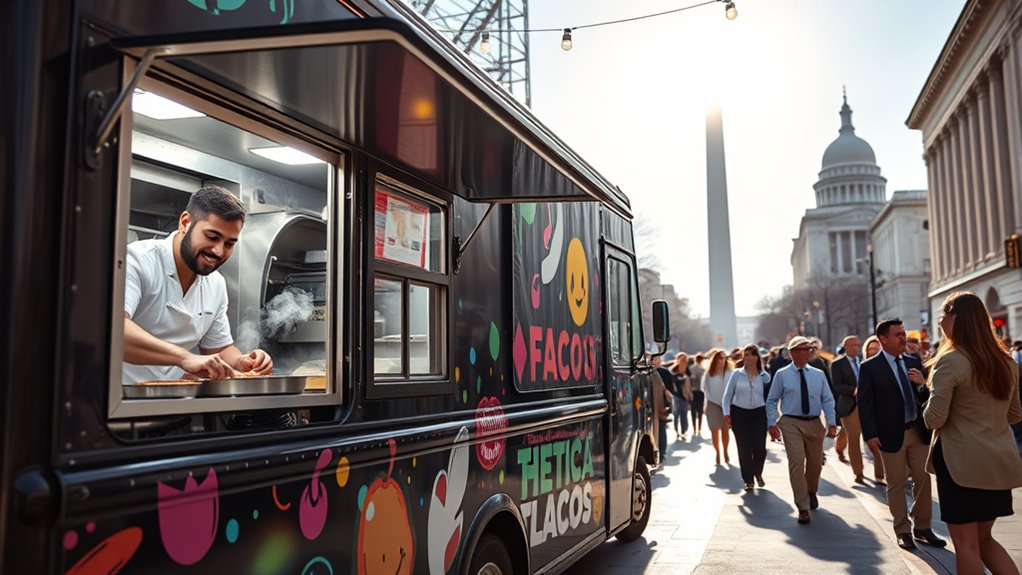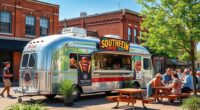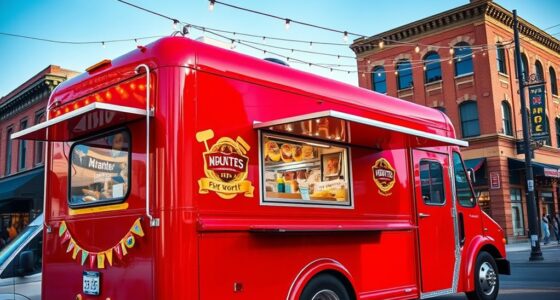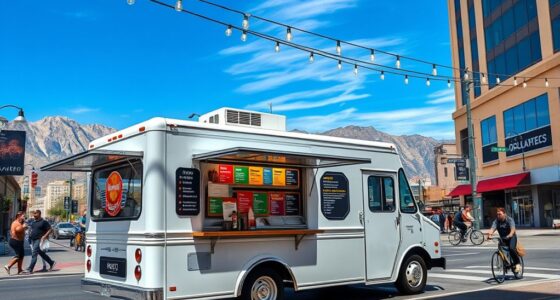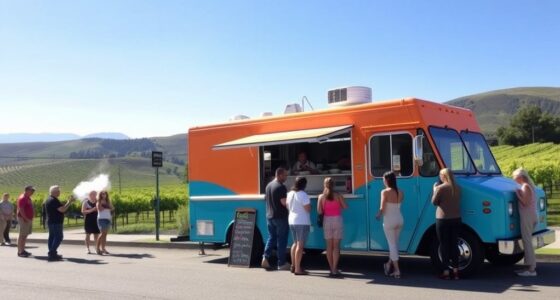To start a food truck in Washington, DC, you need to understand local permits, including health and business licenses, and find approved parking zones. Develop a unique menu that highlights regional flavors and secure funding through grants or loans. Set up a licensed shared kitchen for food prep, plan your branding and marketing, and invest in technology for smooth operations. Want to learn how to navigate specific steps and maximize your success? Keep exploring for detailed guidance.
Key Takeaways
- Complete the necessary online applications and obtain health permits, business licenses, vehicle registration, and food handler permits for operating in DC.
- Choose a unique cuisine concept, develop a menu with regional flavors, and create a strong brand identity tailored to Washington, DC.
- Secure funding through local grants, set up liability insurance, and plan your budget for vehicle customization, permits, and operational costs.
- Find a licensed shared kitchen for food prep, ensure compliance with health standards, and meet all licensing requirements before launching.
- Research street parking zones, restrictions, and event permits in DC to ensure legal and smooth daily operations for your food truck.
Starting With a Unique Cuisine
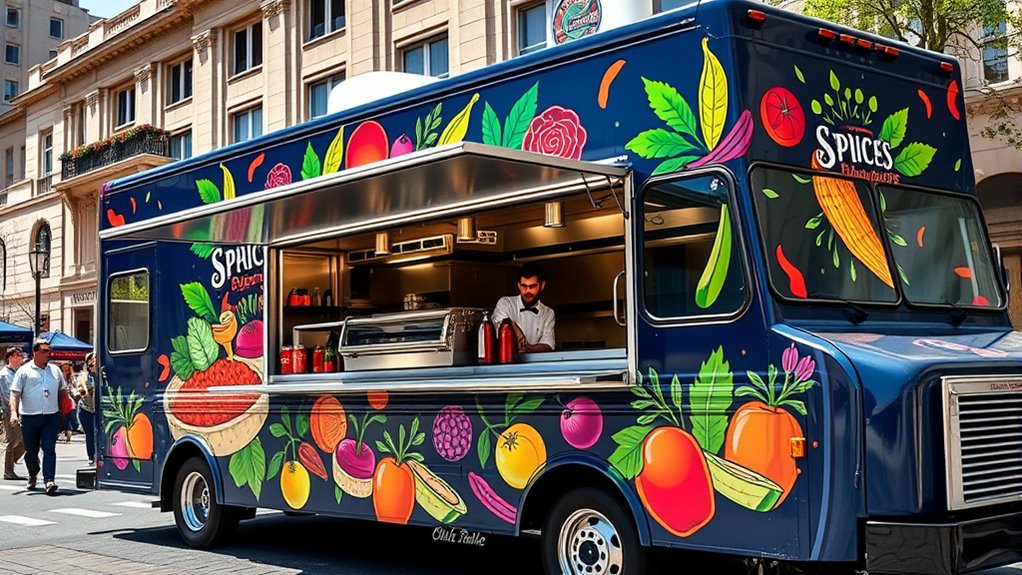
Have you ever wondered how a food truck can stand out in a city like Washington, DC? Starting with a unique cuisine is your best bet. Focus on fusion cuisine to combine different culinary traditions and create exciting, memorable dishes. International flavors attract diverse customers enthusiastic to try something new. Experiment with blending elements from Asian, Latin American, or Mediterranean cuisines to craft signature offerings. This approach not only sets your truck apart but also showcases your creativity. Authenticity matters, so source quality ingredients and perfect your recipes. Keep your menu focused yet innovative, enticing passersby to stop and indulge. By emphasizing fusion cuisine and international flavors, you give your food truck a distinctive identity that resonates with DC’s vibrant, multicultural community. Incorporating inspiration from Best Beaches can also influence your menu offerings with fresh, seaside-inspired ingredients and themes.
Understanding Local Requirements
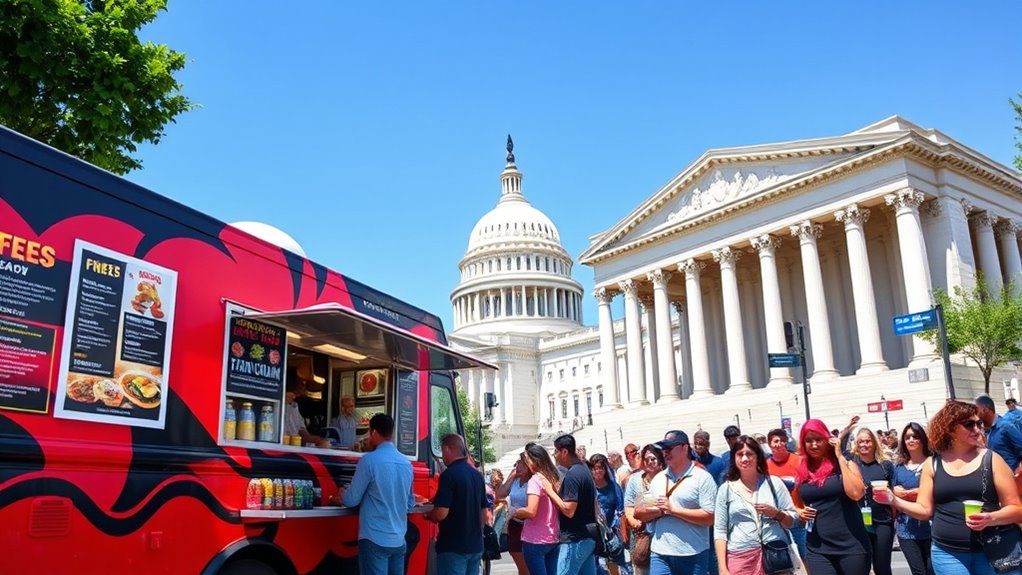
To operate a food truck in Washington, DC, you need to complete specific online application procedures and submit your health permit documentation. You also have to understand the designated street parking zones where you’re allowed to park your truck. Being familiar with these requirements guarantees you stay compliant and avoid potential fines. Developing attention to detail can help ensure all regulations are properly followed.
Online Application Procedures
Guiding the online application process for a food truck in Washington, DC, requires understanding the city’s specific requirements and submitting all necessary documentation through the designated portal. You’ll need to carefully review the procedure requirements to ensure your application is complete and accurate. To get started, prepare these key items:
- Business license documentation
- Proof of insurance
- Vehicle registration details
- Food handler permits
- Evidence of compliance with local zoning laws
Filling out the online application involves entering detailed information about your food truck, menu, and operational plans. Pay close attention to each step, and double-check all documents before submission. Following the online application procedure requirements precisely will streamline your approval process and bring you closer to launching your food truck in Washington, DC.
Health Permit Documentation Process
Managing the health permit documentation process is essential to guarantee your food truck complies with Washington, DC’s strict health regulations. To get started, you need to gather all required documents, including proof of food safety training, a detailed menu, and your food truck’s inspection records. The documentation process involves completing the health permit application and submitting it to the local health department. Make sure your vehicle meets all sanitation and safety standards before applying. Once submitted, expect an inspection to verify compliance. Keep copies of all paperwork handy, and respond promptly to any requests for additional information. Negotiating the health permit process carefully assures your food truck stays compliant and avoids delays that could hinder your launch.
Designated Street Parking Zones
Understanding designated street parking zones is essential for operating your food truck legally and efficiently in Washington, DC. The city enforces specific parking zones that regulate where food trucks can park, ensuring compliance with street regulations. To avoid fines or towing, familiarize yourself with these zone maps and time restrictions.
- Check signage for hours allowed in each parking zone
- Note if parking is limited to certain days or times
- Understand restrictions around residential versus commercial areas
- Identify zones designated for commercial vehicles
- Be aware of temporary parking restrictions during special events
Setting Up Your Base of Operations

To set up your base of operations, you’ll need to consider shared kitchen licensing requirements in Washington, DC, which can streamline your startup process. Choosing the right custom kitchen equipment is vital to guarantee your truck is fully equipped and compliant. Making informed decisions now will help you avoid costly adjustments later.
Shared Kitchen Licensing Requirements
Setting up your food truck’s base of operations in Washington, DC, requires obtaining the appropriate shared kitchen licenses. These licenses ensure your food truck complies with local health regulations and that your shared kitchen meets safety standards. To secure your food truck permits, you’ll need to verify that the kitchen is properly licensed for commercial food preparation. Key requirements include:
- Approved shared kitchen facilities with valid licensing
- Proper sanitation and safety protocols in place
- Regular inspections by health authorities
- Proper signage and labeling
- Compliance with food handling regulations
Being thorough with shared kitchen licensing is essential for smooth operations and legal compliance. Without these licenses, your food truck may face fines or shutdowns, so prioritize meeting all licensing requirements before hitting the streets.
Custom Kitchen Equipment Selection
Choosing the right kitchen equipment is a pivotal step in establishing your food truck’s operational base. Your selection of custom kitchen equipment should align with your food truck layout and menu. Think about the cooking methods you’ll use most often and select equipment that maximizes efficiency within limited space. Custom kitchen equipment allows you to optimize functionality, ensuring you have everything needed without overcrowding. Prioritize durable, space-saving appliances like compact fryers, grills, and prep stations tailored to your menu. Properly designed, your food truck layout with custom equipment will streamline operations, reduce prep time, and improve service. Investing in quality, purpose-built equipment now will pay off in smoother daily operations and happier customers.
Budgeting and Financing Your Food Truck

To successfully launch your food truck, you need to plan your budget carefully, starting with vehicle customization costs. Explore local small business grants that can help ease some of your expenses, and make sure you have liability coverage to protect your investment. Understanding these financial aspects sets a solid foundation for your business in Washington, DC. Additionally, researching cost-effective vehicle options can help you optimize your startup budget and increase your profit margins.
Initial Vehicle Customization Costs
Customizing your food truck is one of the most essential initial investments you’ll make, and understanding the costs involved is vital for effective budgeting. Expect expenses like outfitting the truck with cooking equipment, installing necessary utilities, and adding branding and signage to attract customers. Keep in mind that vehicle maintenance will be ongoing, so allocate funds for regular upkeep. To give you a clearer picture, here are some common costs:
- Custom paint and wrap for branding
- Kitchen equipment installation
- Electrical and plumbing setup
- Vehicle maintenance reserves
- Signage and menu boards
These costs can vary depending on your truck’s size and design choices, but planning ahead ensures you stay within your budget and set a solid foundation for your food truck business.
Local Small Business Grants
Securing funding is a key step in launching your food truck, and local small business grants can be a valuable resource to help cover startup costs. These grants often support small businesses in the community, making them ideal for funding essentials like food truck branding and equipment. To maximize your chances, research local programs such as the DC Small Business Development Center and community foundations. Remember, grants don’t require repayment, but they often come with specific criteria and deadlines. Use social media marketing to showcase your application process and build buzz around your brand. Here’s a quick overview of available grants:
| Grant Name | Eligibility | Application Deadline |
|---|---|---|
| DC Small Business Fund | Local startups | March 15 |
| Community Foundation Grant | Minority-owned businesses | April 1 |
| Neighborhood Revitalization | Food entrepreneurs | May 10 |
| Small Business Innovation | Innovative concepts | June 20 |
| Local Chamber Grant | Washington, DC residents | July 30 |
Liability Coverage for Food Trucks
Understanding liability coverage is essential when budgeting and financing your food truck, as it protects your business from potential legal and financial risks. Proper liability insurance guarantees you’re covered if accidents, injuries, or property damage occur during operations. When choosing coverage limits, consider your daily expenses, potential claims, and the scope of your services. Without adequate coverage, a single incident could threaten your business’s financial stability.
Here are key points to keep in mind:
- Assess your risk exposure and select appropriate liability insurance.
- Understand coverage limits to ensure sufficient protection.
- Consider additional coverage for equipment and inventory.
- Factor in legal costs and potential damages.
- Regularly review and update your policy as your business grows.
Designing Your Menu and Pricing Strategy

When designing your menu, focus on locally inspired dishes that resonate with Washington, DC’s vibrant food scene. Carefully calculate ingredient costs to guarantee your pricing covers expenses while remaining attractive to customers. Balancing creativity with cost management helps you develop a successful menu and pricing strategy. Utilizing cost analysis tools can further optimize your pricing to ensure profitability.
Locally Inspired Menu Innovation
To create a menu that resonates with Washington, DC’s diverse community, focus on incorporating locally inspired ingredients and flavors that reflect the city’s culture and history. This approach enhances your food truck’s appeal through locally inspired menu innovation and flavor fusion concepts. Consider using regional favorites like Chesapeake Bay crab, half-smokes, or farm-fresh produce from nearby farmers’ markets. Experiment with unique combinations that celebrate DC’s multicultural identity. For example, you might blend Southern flavors with Middle Eastern spices or incorporate classic Southern barbecue with local craft beer glazes. These ideas help you stand out and connect with locals. Keep your offerings authentic and dynamic, ensuring your menu captures the essence of Washington, DC, while appealing to a broad audience.
Ingredient Cost Calculations
Effective ingredient cost calculations form the foundation of designing a profitable menu and setting competitive prices for your food truck. To do this, start by carefully considering ingredient sourcing to guarantee quality and affordability. Calculate the cost per serving for each menu item by dividing the total ingredient costs by the number of servings it yields. This helps you understand your expenses and identify high-cost ingredients that may need substitution or portion adjustments. Keeping track of ingredient sourcing costs allows you to monitor fluctuations and adjust menu prices accordingly. Accurate cost per serving data enables you to set menu prices that cover expenses while remaining attractive to customers. Prioritizing precise ingredient cost calculations ensures your food truck remains profitable and sustainable in Washington, DC’s competitive market.
Technology and Operations

Implementing contactless payment options can streamline your sales and improve customer satisfaction. A mobile POS system helps you process transactions quickly and manage orders efficiently. Additionally, stock tracking tools keep your inventory in check, so you’re always prepared during busy hours. Incorporating high-quality projectors with excellent color accuracy can also enhance your food truck’s digital menu displays, attracting more customers.
Contactless Payment Options Available
Have you noticed how many food trucks now accept contactless payments? It’s a game-changer for cashless payments and contactless ordering. By offering these options, you make transactions faster and safer, reducing the need for cash handling and physical contact. This appeals to customers seeking convenience and hygiene. Here are some benefits:
- Quicker checkout process
- Reduced cash handling risks
- Increased customer satisfaction
- Compatibility with various digital wallets
- Streamlined sales tracking
Implementing contactless payment options not only improves your operations but also boosts your reputation for modern, customer-focused service. As more people prefer cashless payments, staying ahead with contactless ordering becomes essential for success in Washington, DC’s competitive food truck scene.
Mobile POS and Stock Tracking
Mobile POS systems and stock tracking tools are transforming how food trucks manage daily operations. With a mobile POS, you can streamline transactions, accept multiple payment methods, and reduce wait times, enhancing customer experience. These systems also connect directly to inventory data, allowing real-time stock tracking. You’ll know exactly when ingredients are running low, helping you reorder before shortages occur. Using mobile POS and stock tracking together simplifies inventory management, minimizes waste, and improves profit margins. Plus, many systems offer detailed sales reports, giving you insights into popular menu items and busy hours. By adopting these technologies, you’ll operate more efficiently, stay organized, and ensure smooth daily operations — all essential for running a successful food truck in Washington, DC.
Marketing and Growing Your Presence

Participating in popular food festivals and markets can boost your visibility and attract new customers. Engaging Instagram stories and promotions keep your audience interested and encourage repeat visits. By combining these strategies, you’ll steadily grow your presence in the Washington, DC food scene.
Popular Food Festivals and Markets
Attending popular food festivals and markets in Washington, DC, offers a prime opportunity to boost your food truck’s visibility and attract new customers. These events help strengthen your food truck branding and open doors for vendor collaborations that can expand your reach. To maximize your impact, consider:
- Participating in themed festivals to target specific audiences
- Offering exclusive menu items for festival attendees
- Networking with other vendors to create cross-promotional opportunities
- Showcasing your unique food truck branding through eye-catching signage
- Engaging with festival organizers for future collaboration chances
Engaging Instagram Stories and Promotions
Leveraging Instagram Stories and promotions can substantially boost your food truck’s visibility and attract more customers. By consistently sharing behind-the-scenes clips, daily specials, and customer reactions, you increase Instagram engagement and keep your audience engaged. Use promotional strategies like limited-time offers or exclusive discounts through Stories to drive immediate traffic. Incorporate eye-catching visuals and clear calls-to-action to encourage followers to visit your truck. Highlight your location, menu items, and upcoming events to build anticipation. Interactive features like polls or question stickers can also boost engagement and gather valuable feedback. The key is to be authentic, creative, and consistent, so your followers feel connected to your brand and motivated to spread the word about your food truck.
Navigating DC’s Food Truck Scene

Exploring DC’s vibrant food truck scene can feel overwhelming at first, but with a little guidance, you’ll find it easy to discover some of the city’s best bites. To stand out, focus on strong food truck branding that captures your unique style and appeals to locals. Pay attention to where popular trucks park, and learn event schedules, festivals, and markets that draw crowds. Building customer loyalty is key—consistent quality, friendly service, and engaging social media posts keep customers coming back. Consider collaborating with local businesses or participating in food truck rallies to increase visibility. Keep track of trending dishes, listen to feedback, and adapt quickly. Navigating this scene means staying informed, being adaptable, and making genuine connections with your audience.
Frequently Asked Questions
What Permits Are Required for Nighttime Food Truck Operations in DC?
You’ll need a valid health permit and a special event permit for nighttime food truck operations in DC. Make sure your food truck branding is compliant, and your vehicle maintenance is up to code for safety and cleanliness. You must also obtain a mobile food vendor license from the DC Department of Consumer and Regulatory Affairs. Always double-check current regulations, as permits can vary based on location and hours of operation.
How Can I Find Reliable Food Truck Suppliers Locally?
To find dependable local food truck suppliers, start by exploring vendor options in Washington, DC through online directories like Yelp or Google Maps. Check supplier reliability metrics such as delivery times, product quality, and customer reviews. Visit local farmer’s markets or food events to network with vendors directly. Seek recommendations from fellow food truck owners or industry groups to guarantee you connect with trustworthy, high-quality local vendors that meet your specific needs.
Are There Specific Health Inspection Standards Unique to DC?
You might find it surprising, but DC’s health inspection regulations are quite specific, focusing on food safety standards tailored for mobile food vendors. You need to meet local requirements that guarantee cleanliness, proper food storage, and safe handling practices. Regular inspections are mandatory, and failing to comply can lead to penalties or shutdowns. Staying informed about these standards helps you keep your food truck compliant and your customers safe, boosting your business’s reputation.
What Are the Best Locations to Park My Food Truck in Washington, DC?
You should park your food truck in high-traffic areas like the National Mall, around Capitol Hill, or near busy metro stations to maximize visibility. Use strategic food truck marketing to attract more customers, and make certain your mobile kitchen design is efficient for quick service. Consider events and festivals too, which boost exposure. Planning your locations carefully helps grow your customer base and increases sales in Washington, DC.
How Do I Build Partnerships With Local Events and Festivals?
To build partnerships with local events and festivals, you should engage in community outreach by reaching out to event organizers and offering your food truck’s services. Use social media marketing to promote your participation and connect with the community. Attend local networking events, sponsor or donate to festivals, and showcase your unique offerings. Building relationships and staying active online will help you secure more partnerships and grow your presence in Washington, DC.
Conclusion
Starting your food truck journey in Washington, DC, is all about passion meeting opportunity. By choosing a unique cuisine, understanding local rules, and engaging with the vibrant scene, you’ll find that success often comes when you least expect it. Keep your menu innovative, embrace technology, and grow your presence steadily. Soon enough, what once seemed like a coincidence—the perfect location or a trending dish—will become your signature, fueling your passion and driving your success forward.
